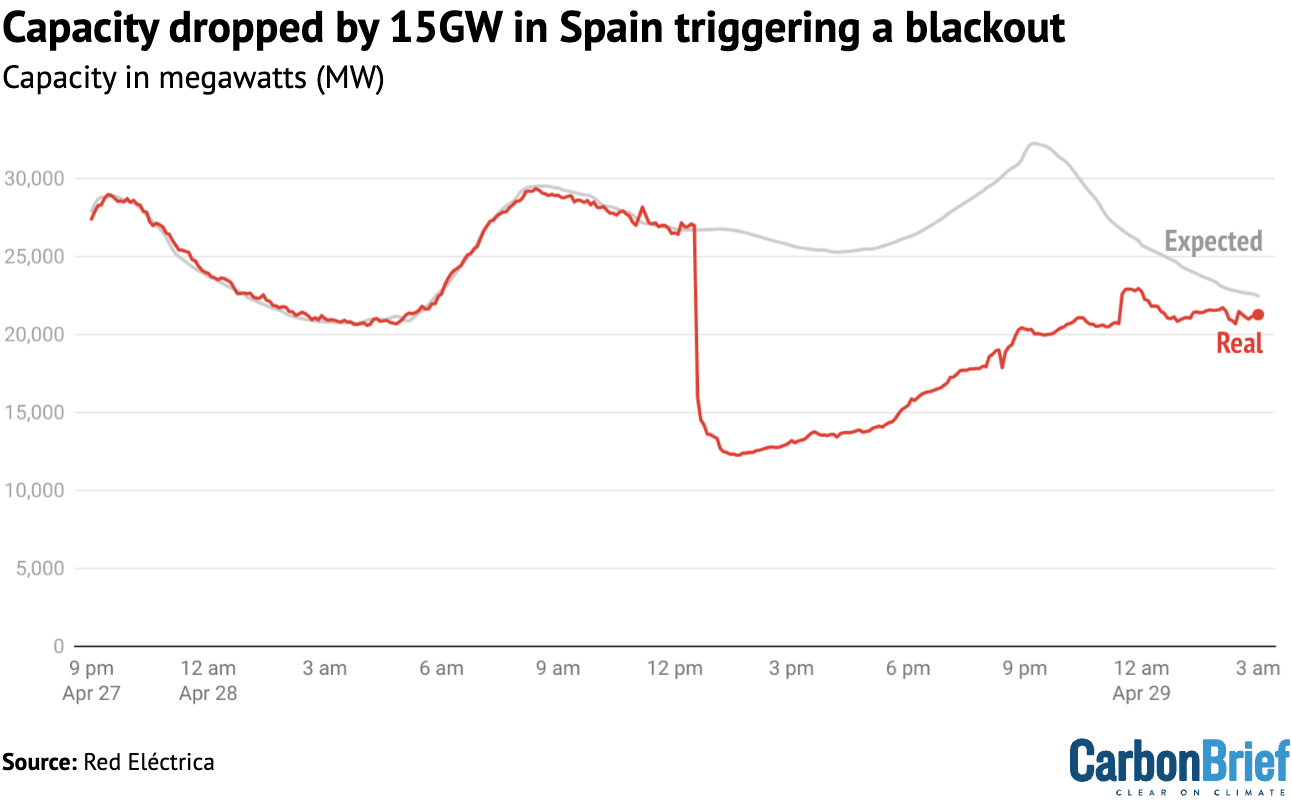
DeBriefed 2 May 2025: Iberian blackout; Tony Blair’s ‘clumsy’ comments; Trump’s ‘cascading’ impact on European climate science
Multiple Authors
05.02.25Multiple Authors
02.05.2025 | 2:58pmWelcome to Carbon Brief’s DeBriefed.
An essential guide to the week’s key developments relating to climate change.
This week
Net-zero media storm
NET-ZERO ATTACKED: The UK’s Labour government had to defend its net-zero policies after comments by former prime minister Tony Blair in a thinktank report sparked a frenzied media storm. Former Labour leader Blair said the world’s current approach to tackling climate change is “failing”, the Independent reported. (More accurately, Blair stated that “phasing out fossil fuels in the short term…is doomed to fail”, rather than at all, as highlighted in a factcheck by Carbon Brief’s Simon Evans on social media.)
MEDIA FRENZY: Blair’s comments were featured prominently – and inaccurately – by the UK’s climate-sceptic right-leaning media. In frontpage coverage, the Daily Telegraph described Blair’s comments as a direct “attack” on prime minister Keir Starmer, despite acknowledging in its coverage that Blair did not mention the UK. A frontpage Times story called Blair’s intervention the “latest sign that the mainstream consensus on green policies is collapsing”. (Carbon Brief has just published an analysis showing the same media have published 65 editorials attacking energy secretary Ed Miliband in the first four months of 2025.)
‘CLUMSY’ CRITICISM: BBC News reported that Starmer has since defended his net-zero policies in parliament. According to the Guardian, Downing Street “forced” Blair to “row back from his criticism”, after “furious Labour politicians warned he had given a boost to Tory and Reform on the eve of the local elections”. A former employee of Blair called his intervention “clumsy” and his ideas “expensive” and “unpopular” in Prospect magazine.
Around the world
- CANADA FOR CARNEY: Mark Carney’s Liberal party won this week’s Canadian elections, Climate Home News reported. The outlet said that Canadians chose the “former central banker and UN climate envoy” over the “anti-climate action Conservative party of Pierre Poilievre”.
- 100 DAYS: As the Guardian and other outlets covered Donald Trump’s first 100 days in office, the New York Times reported that his administration had dismissed hundreds of experts working on the country’s National Climate Assessment report.
- UPHILL BATTLE: The COP30 president has “admitted” that this year’s talks will be a “slightly uphill battle” due to economic turmoil and Trump’s removal of the US from the Paris Agreement, the Guardian reported.
- AIRLINE EMISSIONS: European airline emissions are on course to exceed pre-pandemic levels this year, according to the Financial Times.
- NEW NORMAL: Much of India and Pakistan is “sweltering” under early heatwaves, the Guardian reported. The newspaper highlighted that a Pakistani city in Sindh province recorded temperatures of 50C – nearly 8.5C above the April average.
38%
The percentage of global losses from “natural catastrophes” that were insured in 2023, according to a report by Zurich Insurance Group. The analysis found total losses of $280bn.
Latest climate research
- A combination of climate change and failure to meet sustainable development goals could contribute to an increase in global antimicrobial resistance by 2050, according to a study published in Nature Medicine.
- A paper published in Science Advances found that “co-exposure” to extreme heat and wildfire smoke has increased across 11 states in the western US over 2006-20.
- Just 2% of the UK Climate Change Committee’s (CCC’s) recommendations to the UK government over 2009-20 were accepted in full, according to new research published in Climate Policy.
(For more, see Carbon Brief’s in-depth daily summaries of the top climate news stories on Monday, Tuesday, Wednesday, Thursday and Friday.)
Captured

On Monday, a blackout across most of Spain and Portugal plunged the countries into chaos. While the initial trigger remains uncertain, the nationwide blackouts took place after around 15 gigawatts (GW) of electricity generating capacity – equivalent to 60% of Spain’s power demand at the time – dropped off the system within the space of five seconds (as illustrated above). At the time, solar accounted for 59% of the country’s electricity supplies, wind nearly 12%, nuclear 11% and gas around 5%. As the crisis was still unfolding, many media outlets were quick to blame renewables, net-zero or the energy transition for the blackout, despite very little available data or information. Carbon Brief has examined what is currently known about the power cuts and how the media has responded.
Spotlight
Trump’s ‘cascading’ impact on European climate science
This week, scientists attending the European Geosciences Union meeting in Vienna tell Carbon Brief how cuts to science funding and the dismantling of climate agencies in the US is impacting their work.
Dr Shouro Dasgupta, environmental economist at Fondazione CMCC in Italy:
“Trump’s decision to cut funding on climate science in the US will likely have cascading effects on both European research and global climate resilience. The transatlantic partnership is built on shared values and decades of cooperation. It has been crucial for advancing global understanding of climate change through joint efforts in Earth observation, including data infrastructure and joint policy innovation.
For example, several European Centre for Medium-Range Weather Forecasts products that rely on National Oceanic and Atmospheric Administration (NOAA) data streams will now face gaps in input data.
A major loss has been the defunding of Famine Early Warning Systems Network – a critical system that operated in more than 30 famine-prone countries and was the only consistent source of regular famine and food insecurity early warning.
Trump’s actions will slow our ability to understand and respond effectively to the climate crisis, a loss that, ultimately, impacts everyone.”
Dr Carl Schleussner, climate scientist at the International Institute for Applied Systems Analysis in Austria:
“I’m concerned about the credibility of science and communication. Attacks on science and scientific integrity are being driven by social media and alternative media platforms – and artificial intelligence (AI) systems can generate something that looks like a scientific paper, [but] is complete rubbish. [AI] basically drives down the cost of fakes to zero. We are running a heightened risk of climate misinformation.
Trump’s special advisor [Elon Musk] owns one of the largest social media networks and Grok [an AI system] can produce something like a paper in no time. Trying to undermine [science] by flooding the zone with sh*t is a declared strategy – and it is the total antithesis to science.
It is one thing to rebut people that are paid to ask stupid questions about the validity of climate science, as we’ve done for decades. [But it is another] to fight an AI system that produces all this bullsh*t in no time. As a scientific community, we are not equipped to fight back…I hope other actors in society are thinking about how to support climate science and the integrity of science and its role in society.”
Dr Eva Pfannerstill, atmospheric chemist at Forschungszentrum Jülich in Germany:
“The NOAA cuts are definitely impacting the air-quality research community and rippling to Europe. For several months this year, our NOAA colleagues were not allowed to join online meetings with us anymore, stalling the fruitful discussions and collaborations we have had for many years. One NOAA colleague was supposed to give an invited talk at EGU, but he was not allowed to travel.
Thinking back to last year’s EGU where we hung out with many NOAA colleagues, it was such a short time ago – but seems almost like another era where trans-Atlantic scientific cooperation and US leadership in atmospheric research were a given. Now our US colleagues are scared – scared to put anything in writing that could be used against them, scared of losing their funding and/or jobs.”
Prof Sonia I Seneviratne, climate scientist at the Institut für Atmosphäre und Klima at ETH Zurich in Switzerland and Intergovernmental Panel Climate Change Working Group 1 vice chair:
“The current attacks on climate research in the US are extremely concerning. A full generation of young researchers have been fired from their positions and are unlikely to stay in climate research. While some might move to Europe or other continents, it is not in the interest of the global climate research community to see such a weakening and even a destruction of climate research in the US.
While some decisions against climate research institutions and researchers might be annulled by the courts, several might be near impossible to reverse. For instance, buildings [that] will no longer be available for research institutions and researchers [that] move on to other positions out of concerns for their job security.
Attacks on climate science won’t change the facts and the reality of climate change – but they weaken our possibilities to address the climate crisis.”
Watch, read, listen
POWER PLAYER: For Common Dreams, Bill McKibben claimed that Mark Carney knows “roughly 20 times” as much about climate and energy economics than any other leader.
CONNECTED CRISES: In a new book, Climate Injustice, climate scientist Dr Friederike Otto argued that global justice is at the core of the solution to climate change.
SONG AND SEED: Al Jazeera ran a long-read about efforts led by Brazil’s Indigenous Maxakali community to protect and restore the rainforest in Minas Gerais.
Coming up
- 2-9 May: 20th session of the United Nations forum on forests, New York
- 7-8 May: Copenhagen climate ministerial, Denmark
- 11 May: Albanian parliamentary elections, Albania
Pick of the jobs
- Carbon Brief, summer journalism internship | Salary: London Living Wage (£13.85 per hour). Location: Hybrid (London and remote)
- C40 Cities, reinventing cities project manager | Salary: 108,074,116 pesos or 715,392 rand. Location: Colombia or South Africa
- Natural History Museum, curator, algae | Salary: £34,398. Location: London
- Agora Energiewende, project manager – policy design for a just energy transition | Salary: Unknown. Location: Berlin, Germany or Bangkok, Thailand
- Possible, community heat and energy project manager | Salary: £33,962 for four days a week. Location: UK
DeBriefed is edited by Daisy Dunne. Please send any tips or feedback to [email protected].
This is an online version of Carbon Brief’s weekly DeBriefed email newsletter. Subscribe for free here.



